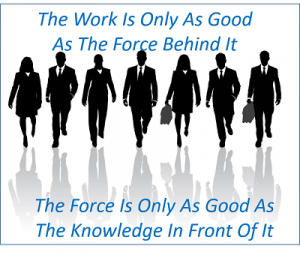There are a number of issues that have to be addressed when creating a virtual workforce, and one of the most vital is whether the company is truly ready for the development of that workforce.

Virtual workers have needs that are not the same as traditional workers, and because of that managers may miss the mark when trying to develop a workforce, and not ensuring it is operating as efficiently and effectively as possible. This is important to note, because managers who fail to ensure that a company is ready for this kind of workforce do the company a disservice by creating something unsustainable.
One of the vital areas of readiness a company needs to address when developing a virtual workforce is cultural sensitivity and understanding. A virtual workforce will most likely be comprised of a number of different types of people, all with different personalities, belief systems, goals, ideals, and ways of communicating. Because of that, a company has to be ready for the potential conflicts that are going to arise between workers. Even people who do not interact with one another in person can struggle to get along with each other, and the more a company is sensitive to other cultures the more that company will be able to handle changes.

An enhanced level of competitiveness is also highly important. Companies are in competition with others who offer similar services or sell similar items. They need to make sure they are competing the right way, and they need to be "hungry" so they can continue to grow. By choosing to develop a virtual workforce and making sure it is a quality group of committed employees, it is easier for a company to be competitive in the marketplace. But a company has to understand that being competitive is about more than just trying to sell things. It is also about being proactive, operating efficiently, and building strength for the future. A virtual workforce can help with that, for a prepared company.

Furthermore, virtual employment means both conflict and growth. It can be hard for a company to grow if it does not have a strong mix of people bringing their ideas and values to the table. But that same mix of people can also mean some conflict in the organization, as well. Personalities can clash, and cultural and other types of differences may not always blend very well. Strong management is part of a company that is ready to develop a virtual workforce, and is a good indicator of a company that can handle the unique challenges that come about from working with people all around the globe. Some conflict is a good thing, and when handled correctly it leads to even stronger growth.

Additionally, among the ways a company can be ready for the development of a virtual workforce is through its valuation of tolerance and relationship building. Companies that are focused too much on doing things the way they have always been done, indicate that they are intolerant of new ideas. They are not interested in building a relationship with their employees. Instead, they try to be in complete control and want their employees to do only what they are told. While that can work for some companies, those that want to get full use from a virtual workforce will need to build relationships with those workers and be tolerant of other ideas.
On the other hand, not all companies are 'fit' enough to utilize virtual employment. While it may seem unkind to call a company "unfit", it simply means that the company is not yet ready to utilize a virtual workforce. This is not always an easy thing to accomplish, and many companies have not yet developed a maturity when it comes to the virtuality of their workforce. The style of management for this type of workforce is different, and there are technological and logistical issues that also have to be worked out. Additionally, how people work together when they are far apart is simply not the same, and understanding the value of frequent interaction is a highly important part of company maturity.

The point to be made is, every company must prepare for a workforce that is virtual. When a company wants to use a virtual workforce, it has to assess whether it is ready for that. Preparation is key to success, and it is not realistic for a company to move from a traditional workforce to a virtual one without any kind of preparation. Instead, how the workforce will be developed, what it will be utilized for, and the adjustments that need to be made for its success all have to be carefully considered. From that point, a company can move forward with developing their virtual workforce. If they do not take the time for preparation, though, they may not be able to use their new workforce effectively.

Readying a company takes time, effort, and dedication. A company that is assessing its readiness for a virtual workforce should take its time. This will not happen overnight, especially if the company has not yet taken any steps to move toward virtuality in its employees. But with effort and dedication over time, it is certainly possible for any company to develop the 'fitness' it needs to develop and use a virtual workforce. A company wants to get the most from any employees it hires, and when employees are all over the globe that can seem more difficult to do. But, in reality, it does not have to be more difficult. It is simply different, and has to be addressed correctly.

Lastly, a commitment from management and employees is needed. No matter how ready a company is for a virtual workforce, committing to that workforce is vital. Management needs to be focused on development and maintenance, and employees need to be committed to working with leadership to help things operate more smoothly. By doing that, everyone can contribute to the creation and operation of the virtual workforce, and the chances of success will be much higher.

